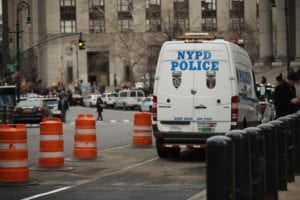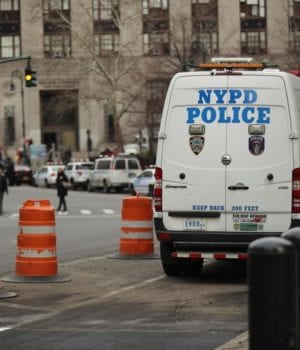NYPD Officers Accused of “Collars for Dollars” Arrests at End of Shifts to Rake In Overtime Pay – By Molly Olmstead (slate.com) / Feb 20 2018

Spencer Platt/Getty Images
Four New York police officers appeared in federal court on Tuesday to defend themselves against accusations they arrested a man near the end of their shift in order to rack up overtime pay, according to the New York Times.
If any of the officers are found liable in the civil rights trial, a second trial that would examine the question of whether the “collars for dollars” practice of making arrests to increase overtime is widespread—and tolerated—in the NYPD.
The complaint centers around an arrest made four years ago, when police arrested two men suspected of engaging in drug deal. One of the men arrested, Hector Cordero, was searched, but police failed to find evidence of drugs. The owner of the mini-market where he worked also said Cordero was working at the time of the drug deal. At 8 p.m., around four and a half hours after the officers’ shifts ended, Cordero was released from the courthouse without being charged; the other suspect, who has since pleaded guilty to drug possession, had already been released. One of the officers claimed later in his paperwork that he worked until 11:30 that night, and another said he worked past midnight. The officers collectively pulled in as much as $1,400 for more than 20 hours in overtime for bringing the men in and processing them. Cordero has argued the arrest was fraudulent.
Complaints of the “collars for dollars” and similar practices have surfaced in past decades. According to the Times, a 1994 report about police corruption concluded that police would maximize the number of officers involved in making an arrest, sometimes to act as witnesses, to allow more officers to receive overtime. The report mentioned another overtime scheme called “trading collars,” according to the Times:
[O]fficers sometimes directed arrests to the member of their team who stood to get the most overtime. Felony arrests are often presented to a grand jury about five days after the incident; but if an officer who took part was scheduled to work on the anticipated grand jury date, he or she might defer to a colleague who was not.
The second officer would “take the arrest,” and receive the extra pay for going to court on a day off — even if that meant testifying about events the officer had never witnessed, the report maintained.
One of the officers involved in Cordero’s arrest had been suspended once before and required to pay back $1,200 in overtime pay for hours he did not work, according to another Times article.
According to the Times, the city’s Law Department has said Cordero’s arrest was valid and “supported by probable cause.”




















